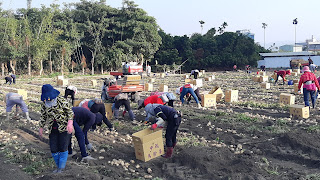On the Sunday before, about 50 farm workers, several tractors, and one substantial flatbed truck rolled up to the potato fields beside my apartment. The two acres swarmed with activity.
Compact Kubota tractors turned over rows of puffy white potatoes. Then farm workers, primarily grandma-aged women, nimbly filled 24kg cardboard boxes. Ton after ton of boxes layered the flatbed truck. Soon, the acres were swept clean, and the team moved on.
Now comes the interesting part. In Taiwan, okay, at least in Taichung county, once a potato field is harvested, anyone can come on the field and collect what’s left over. The farmers are only after the large potatoes. The smaller ping-pong size potatoes are left behind, just the right size for roasting. Often, larger potatoes with a nick or slight blemish are discarded. They’re fine if used relatively quickly.
Families, neighbours, or passersby can stroll the freshly tilled fields and collect the remnants. I’d heard about this free potato bonanza before, so I joined the amateur harvesters with my plastic supermarket bag.
I turned over potato greens, picked the tiny tubers and studied the larger cast-offs for damage. Several softball-size giants required only slight trimming or surgery. They’d be fine.
But what stuck in my mind was why. Why do farmers let strangers wander their fields? Farmers will even post harvest times on community bulletin boards or local farm co-ops so people can prepare. I kept filling my bag and wondering.
Back at school, I asked another Taiwanese teacher, an agricultural college grad, that question at the elevator.
The out-of-right-field question took Safena a few seconds to register and answer. “Well, potatoes aren’t their main crop.” I gawked, “what?” She continued, “Those farmers make their living growing rice. Potatoes are something extra.” I gawked again. Safena, in her best teacher voice, slowly explained, “farmers make most of their money growing rice. Potatoes are extra, something to grow between their main crop. And potatoes help fix nitrogen in the soil.”
It dawned on me. Generosity. Rice has already covered the bills, so why not share the bounty? It’s true the underground vegetables turn into potato chips and French fries and still make cash, but why not pass around a few Russets?
Back in the field, a father, son, and daughter scour the rows. The kids check their potato bags like Halloween trick-or-treaters checking their candy haul. A neighbouring farmer arrives barefoot with his wife and a hand cultivator rake ready for business. I can’t recall the last time I stood in sun-warmed soil shoeless but I had the urge to take off my Nikes.
More people arrive and dig. Groups compare harvests, laugh, and help each other identify yet checked areas.
And I imagine the satisfaction the farmer must feel. He is sharing his good fortune with his friends and neighbours. It’s another form of kindness – unselfishness. And I realize it’s something I’ve seen practised in different ways worldwide. Here in Taichung county, it takes the form of tiny potatoes.


No comments:
Post a Comment